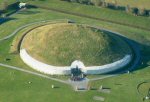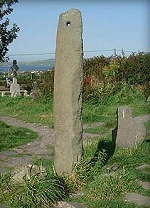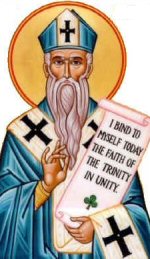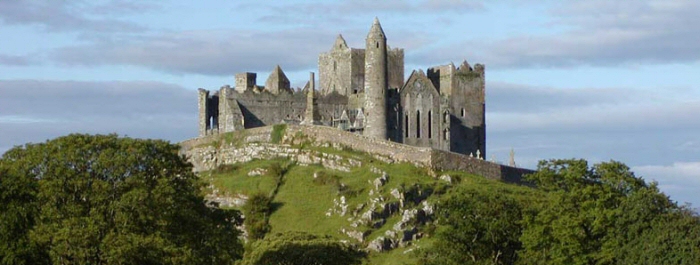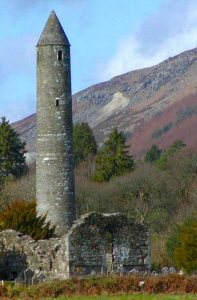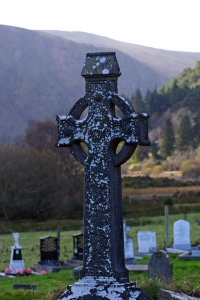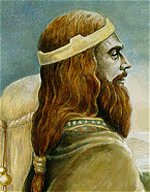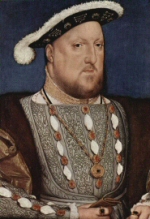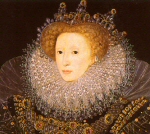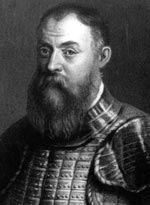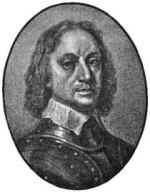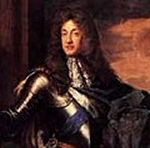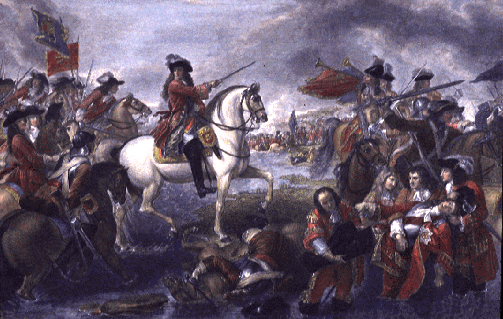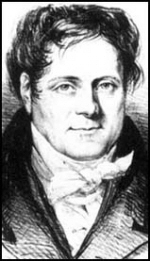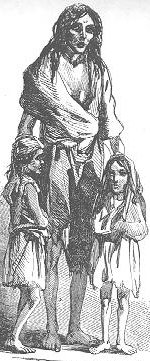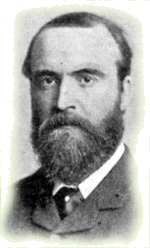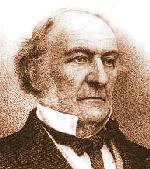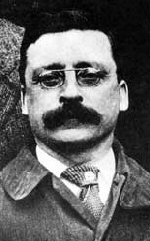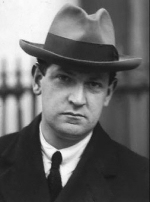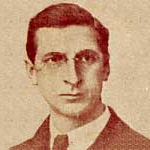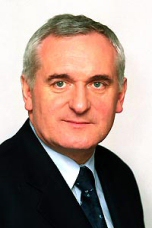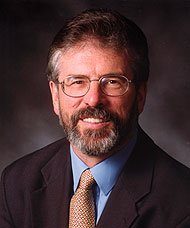Milestones
|
Celtic Ireland (4th c. BC ® 12th c. AD) |
Small
kindgoms/tribes, no unity, St. Patrick converts
the Irish |
|
Viking invasion (9th -10th c.) |
1st towns are founded, International trade |
|
Norman
invasion (1169 - |
|
|
Protestant colonization (1550s) |
No to Protestantism,
Penal Laws,
Uprisings/Rebellions, Test Act |
|
|
Emancipation, Famine,
Emigration, Land Reform, No Home Rule |
|
|
Civil War, Republic, Civil Rights Protests, 'The Troubles', IRA, Direct Rule |
|
Self-government in NI (1999-) |
Ceasefire, 1st
Protestant-Catholic Coalition Government |
|
|
Megalithic tombs (Newgrange, Meath)
...built by Neolithic farming communities about 5000 years
ago, the passage tombs have clear astronomical alignments such as the Winter
Solstice Sunrise.
|
|
an Ogham stone
|
4th c. BC
Celtic tribes begin to invade: came from
§
5 kingdoms:
§
Each kingdom was further
subdivided into mini-kingdoms (tuath) ~ 150
§
Class society: king, druids, bards, poets, soldiers,
craftsmen, farmers, herdsmen, slaves
§
No towns!
®
but farms with large families
§
Religion:
§
"Writing": inscriptions or
runes (Ogham stones) |
Christian era (St Patrick brings Christianity
to Ireland - 432)![]()
|
St Patrick
|
§
Writing was introduced
§
~800
monasteries were built
ú
Centres of
education and religion (eg. Glendalough,
Cashel - see below) ú Produced invaluable manuscripts: Book of Kells (4 Gospels)
“From the fall of
ú
Sent out missionaries to
all over ú Architecturally unique: Round tower, Celtic Cross
|
|
Brian Boru |
§
Their main target: monasteries
(great treasures)
® decline of the
great monasteries
§
Main merit: established the 1st towns in
§
defeated the Vikings
® Vikings
started to assimilate
§
United the country: 1st
king of all
|
|
|
Internal power-struggle
®
An Anglo-Norman army (1169 led by
Strongbow of Wales) was invited
by the king of
Irish Revival: 14th-15th c Anglo-Norman
influence shrinks to |
|
Henry VIII
Elizabeth
O'Neill
Oliver Cromwell
James II |
Henry VIII
1st
English king to control all
TO CONVERT
§
Convents + monasteries were
closed (1539) Catholic churches and
cathedrals are turned into
Anglican Churches
(
§
WAR for land turns into war for 'religion § 1550s: 1st English settlers (Protestants) § 1st Penal Laws force the Irish to convert to the Anglican Faith
§
1560s
Irish rebellions
® Spanish come to
help: but the Spanish Armada is destroyed
§
1590s
O’Neill’s
Rebellion in the North (Ulster): Irish victories
®
§
1601
§
1st time: All § Had they not been divided by religion, the Scots, the English and the Irish probably would have intermarried and assimilated to the Irish – as it had happened in the 14-15th c with the Anglo-Normans and the native Irish.
Charles I
(Instead of
calling Parliament together in England to vote for new taxes in England) he imposed new taxes
on the Irish
®
1641 Protestant
settlers were massacred in
Charles II
More Irish boys and women are sold to work
in slavery
James II
flees to
William III
Penal Laws: all power given to the Protestants (10% of
population)
To force conversion to Protestantism (1690 – 1790s)
Catholics could NOT:
ú
Inherit or buy land
ú
Practice their religions
ú
Live in larger towns
ú
Attend Catholic schools (these
were closed or turned into Protestant schools)
ú
Go to University
ú
Take office (teacher, lawyer, Member of Parliament, army)
ú
Vote
ú
Defend themselves (carry weapons)
ú
Marry a Protestant
ú
All Catholic priests had to
leave the country
® death sentence for those
who refused and to
those giving them shelter! (~1000
priests were exiled)
® French priests poured in as
missionaries risking their life
ú
Celebrating mass was illegal (including
Christenings, Weddings, Funerals in old abbeys or monasteries)
ú
Attending the Anglican church service
was compulsory (missing it cost 12
pence each Sunday)
ú
Taking the Oath of Supremacy was
mandatory:
ú
Anyone reporting a priest or any
offence against the Penal laws was rewarded
® To evade the evils of the Penal Laws all
that was required was to renounce the Catholic faith and become an Anglican (
®
Despite the unbearable
hardships the Irish Catholics did not give up their
religion. They became a landless, helpless, hopeless,
uneducated and
disenfranchised people in their
own country, too poor and weak to pose any
threat to the oppressor
Protestant foreign elite. And while
their hard work
contributed to the prosperity
of the English and Scottish rulers, the Irish had
the
lowest living standards in all of
§
Jonathan Swift born of English
parents in
§
Huge famine in 1740s (300.000 dead)
§
1759 Arthur
Guinness starts producing stout (black beer);
Today Guinness is one of the biggest beer companies in
§
Concessions lead to the
Revolution of 1798
§
§
1782 the Irish Parliament is granted
legislative independence!
§
1793 (Catholic Relief Act):
ú
Catholics can vote (but they could not
vote FOR a CATHOLIC person – Catholics cannot be MPs, plus voting was
open – always in line with the English landlord’s wishes)
ú
Could become sheriffs, jurors,
officers (but could not obtain the necessary education) ú Own weapons (under specific conditions) ® Protestants become alarmed ®
§
1795 Protestants establish the Orange
Order: named after their hero, William of
(Still active in
§
Society of United Irishmen (formed by Protestants and Catholics in
|
![]()
|
Daniel O’Connell
|
The Irish Parliament was suspended ®
(MPs from
No Catholic MPs in
§
became a mass-based
organization
§
aim:
peacefully achieve the right for Catholics to be MPs +
repeal the
§
Success in achieving Catholic Emancipation (1829):
§
Catholics can
become MPs in (
§
However, no home rule
granted to
§
Irish Catholics no longer have to
pay taxes (tithes) to the Anglican Church (1838)
1845-48
Famine: 1 million people starved to
death
§
Potato crop was
attacked by a fungus
§
People couldn’t pay
rent to the landlords
® had to leave the land +
their home
§
1 million emigrated to the
§
Others earned their
miserable living digging ditches and building roads – paid by the British
Government to relieve the desperate situation = resentment and anger towards the English
for “standing by idly” ( ® 1848 a failed uprising
® IRB: Irish Republican
Brotherhood: organization set up in
§
1867 many Irish return from
§
§
The Irish Party became the “Tip of the scale” in British politics in
the 1860s and
onwards – both the Liberals and the Tories tried to gain
their favour. No party
could gain enough seats to win the elections and form a
government on their own. |
|
Charles Parnell
William Gladstone
Arthur Griffith |
1870s
campaign for
Home Rule (Irish self-government: Parliament in
“The Irish question” takes central role in British politics: William
Gladstone PM: “My mission is to pacify
§
1st Irish Land Act (well-meaning
but ineffective, 1870)
§
Disestablished the Anglican Church in
§
Removed religious (entrance) tests at
universities
® Catholics can get scholarships, become
professors!!
§
Secret Voting introduced at elections!!!
(1872)
® Irish men can finally
vote for Catholic
radical MPs without risking the fury of their Prot.
landlord (and losing their
tenure)
§
Threat of famine
® many landlords evict tenants
®
Land War (Boycott) to
force new reforms (1879-82) Fair rent or boycott!
§
Peasants
burnt the harvest, maimed the cattle, dug symbolic
graves for
the landlords in front of their homes, etc to demand fair treatment from them (landlords had been raising the price of
the
rent for
the allotted land at their whim, evicting tenants and giving the land to other
peasants, etc.)
§
Revival of Irish Gaelic
culture! (language,
sports, history, legends)
§
Gaelic Athletic Association: immensely successful at reviving Gaelic
football
and hurling. Any GAA member who went to even just watch a
“foreign” sport (cricket,
football) was disqualified
§
Gaelic League: to revive the Irish language in the entire nation
§
Parnell leads the Irish Party (85 MPs in 1885) in
§
Liberals want to please the
Irish (the party that the Irish join in a
coalition
will
form government!!)
® PM Gladstone’s 2nd Land Act
1881 (more effective than the previous one)
(The
Irish tenants were promised fair rent, fixed tenure, and the
freedom to
sell their right to rent the land – bérleti jogot tovább
lehet adni a földesúr
beleegyezése nélkül.)
1st Home Rule Bill for
2nd H.R.Bill rejected by House of
Lords
®
® Sinn Fein
(We Ourselves) founded by
Arthur Griffith:
Irish MPs should
stay in
3rd H.R.Bill rejected by the Lords ® it
automatically became law but was
suspended due to World War I
§
Ulster Protestant population
afraid of independence from |
|
Michael Collins
Aemon De Valera |
§
1916
Easter Rising: World War - the British are distracted –
perfect timing…?
Fenians occupy the Post
(Office (on
§
1918 elections: Sinn Fein won all the seats
outside of
§
1919-21
Anglo-Irish War (War
of
Nationalists Fighting for an independent vs
Unionists Protestants fighting to remain within the
§
1920 1st Bloody
Sunday (Gaelic Match)
§
1921 (Dec.)
Anglo-Irish
Treaty: Partition (political division) of
§
Signed by Michael Collins, Arthur Griffith and Lloyd George (British PM)
®
§
§
§
26 counties become independent
from
the Commonwealth and loyal
to the English
monarch
§
§ 1921-22 Civil War: initiated by Aemon De Valera’s party (Sinn Fein) which would not sign or accept the terms of the Treaty ® demanding a republic
§
Michael Collins is the
Commander of the Irish forces and the President of the
ú
W.B. Yeats is the 1st
Irish to receive the Noble Prize
(1923) in literature
ú
G.B. Shaw gets the Nobel
Prize
in literature
De Valera dissolves Sinn Fein
®
establishes the Fianna Fail Party
®
wins the elections
®
§
De Valera is PM for 16 years then President for 14 (1959-73)
§
Opposition: Fine Gael Party (United
New Constitution (1937) (mainly the work of De Valera)
§
§
The territory of the
state was declared to be “the whole
§
But Irish laws applied
only to the 26 counties
§
The head of the state
is the President (~republic!)
§
Conservatively Catholic:
ú
The integrity of the
family was to be protected
®
Divorce was made illegal
ú
Freedom of speech,
assembly was granted
®
but subject to
public order and morality
ú
The
place of women was to be “within the home.
Mothers shall not be obliged by
economic necessity to engage in labour to the neglect of their
duties within the home.”
ú
Freedom of religion granted to a list of religious
groups
World War II:
1949
|
Civil Rights![]()
|
|
System of Apartheid: separate schools, neighbourhoods, sports
teams for the
Catholic and Protestant
communities
1968
® Catholic Civil
Rights Movement – peaceful marches demanding
equal treatment in:
§
Employment
§
Housing
§
Reorganisation of the
Police force: 95% of policemen were Protestants!
®
Clashes between Catholics and
Protestants on the streets
®
British
soldiers are sent to The IRA begins its killing and bombing campaign to force the British government to pull back its soldiers ®
1971-75 the policy of internment
– (IRA) terrorist suspects can be arrested
without any proof or
process
® many peaceful civil rights activists arrested
(The
movie: In the Name of the Father – true story)
1972 30th
January Bloody Sunday – mass
demonstration in
§
3 days later: IRA burns down the British
Embassy in
§
March: riots – British PM transfers complete
control from
§
21st July:
Bloody Friday – 20 bombs explode all over
1973
1984 bomb aimed at Margaret Thatcher (she is saved, but 5 die and many
more wounded)
1993 ® IRA announces a cease-fire!! (1994) ® Talks begin between IRA + politicians Rapid economic growth in the Republic ® Celtic Tiger
|
Self-government in Northern Ireland![]()
|
|
Oct. 1997 First (official) meeting between an IRA leader and British PM since 1921
April 1998: Good Friday Agreement: signed by (left to right) Tony Blair (Br PM), Bertie Ahern (Ir PM), Gerry Adams (Sinn Fein), David Trimble (UUP)…among others.
The main provisions:
1. New Northern Irish
Assembly in
2. Coalition government (Catholics and Protestants together in gov.) “All key decisions will be taken only with
cross-community support.”
3. Several
North/South Ministerial Councils will
be set up
(cross-border bodies)
4.
Decommissioning of paramilitary weapons
(terrorist groups hand in weapons)
5. Changing the composition
of the NI police
(also its ethos, symbols, etc)
6. Modify (amend) the Irish
Constitution (1937): The territory of the state should not
be declared to be “the whole 7. Release political prisoners... (Yes, that means releasing terrorists as well)
Referendums on approving or rejecting the Good Friday Agreement
®
NI:
71% approved the Agreement
®
Elections for the NI Assembly (
® First Minister:
David Trimble (
® Deputy
First Minister: Seamus Mallon (Social Democratic and Labour Party)
Oct. 1998 David Trimble and John Hume receive the Noble Prize in Peace for their role in bringing the two sides together to
negotiate
Dec. 1999 NI Assembly
receives devolved power from
Feb. 2000 NI Assembly
government is suspended: IRA’s failure to decommission its guns
May 2000 powers devolved again
July 2001 David Trimble resigns |
learn more:
sources:
Foster, R.
F. The
The History
Book of
How the
Irish Saved Civilization by Thomas Cahill (New York, 1995)
Facts About
Guide to
British and American Culture.
http://www.umn.edu/irishlaw/intro.html (2001.11.26) On the topic of Penal Laws
http://www.rootsweb.com/~fianna/history/index.html
Department of Foreign Affairs,
